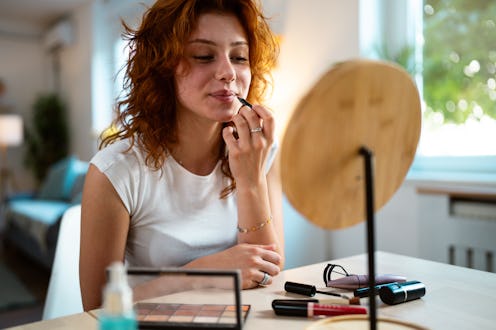Fashion
Why Your Skin's Undertone Doesn't Matter

You've heard it your entire life: Your skin's undertone makes a huge difference in the type of makeup you should be wearing. But does it really? I still don't know if I'm technically cool, warm, or neutral toned, and I wanted to find out, once and for all, if it even mattered. Here are seven legitimate reasons your skin's undertone doesn't matter, and why you shouldn't get so hung up on warm vs. cool.
If you spend any time at all on YouTube or Instagram following beauty and makeup gurus, you know that the warm, cool, and neutral undertone conversation is constant. In fact, MAC Cosmetics names their foundations and powders after skin undertone colors. Must be important, right?
According to the various experts on the 'net, you can figure out what your true undertone is by noticing the color of your veins. If they are blue-ish, you are cool toned. If they are green, you are warm toned (and, according to Makeup Geek founder Marlena Stell, most people are). If you can't really tell if your veins are blue or green, you are most likely neutral toned. Great. Now what are you supposed to do with that information?
Apparently, your undertone is supposed to dictate what makeup you wear and how you wear it. I'm here to call BS. Here's seven reasons why your skin's undertone doesn't matter.
1. It Doesn't Affect Eye Makeup
According to Stell, your tone isn't going to affect your eye makeup whatsoever. "If you want to wear purple eyeshadow, green or teal or blue or whatever, it doesn't matter." Boom.
2. Your Dye Job Matters
Stell also suggests that the color of your hair might be more of a guide to your makeup than your actual skin tone. When choosing blush, go with the opposite shade of your hair. If you have a cool-toned black and blue dye job, try a warmer blush. If you have caramel highlights, go for a cool-tone blush to compliment.
3. Neutral Is Usually Best Anyways
This is especially true for contouring. Warm bronzers and contours can give a Ronald McDonald vibe, but neutral-toned browns are flattering for any person's contour.
4. Labels Don't Always Get It Right
While some makeup companies, like MAC and L'Oreal, label their foundations based on skin tones, there's still a chance it won't match what you're looking for. MAC labels pink, cool-toned foundation as warm and more yellow, warm-toned foundation as neutral cool.
5. The Tests Are Tricky
Do you burn easily? What color are your veins? What jewelry looks best? These qualifying questions are supposed to help identify your "true" skin tone, but they often leave us with ambiguous or situational-based answers. Plus, our subtle preferences (I love gold baubles!) tend to muddy the waters. You may love a blue toned red and that looks great and makes you feel confident, so who cares what your undertone is?
6. It's About Preference
Again, at the end of the day you'll look best when you're confident. Maybe purple lipstick or cherry blush makes you feel confident — go for it! Rules are made to be broken, especially in the beauty industry.
7. There's No Definitive Way To Determine Your Undertone
As I mentioned above, the tests can be really difficult. One test can work for one person, but might not work for you. There's not one way to determine everyone's undertone.
Images: SrdjanPav/E+/Getty ImagesAttribution